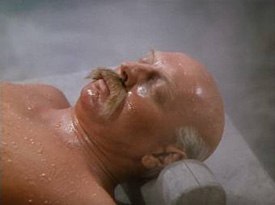Released in Britain in 1943, this film was banned by Prime Minister Winston Churchill for foreign distribution until 1945. Unlike many of the war films of WWII, the picture isn’t blatantly patriotic, centering its attention on a bloated, walrus-mustached “Colonel Blimp” character, who some feel Churchill felt was a satire of himself.
The title may seem like an enigma for those not familiar with who Colonel Blimp was. He was cartoon character created by David Low, who was a fat, pompous, irascible, jingoistic and stereotypically English soldier. The directing, writing and producing team of Michael Powell and Emeric Pressburger (THE RED SHOES, BLACK NARCICUSS) take this archetypical character and use it as a launching point to tell the story of a career soldier who desperately tries to hold on to his usefulness as he grows older. The 40-year time frame and the “downfall” of the main character in many ways reminded me of CITIZEN KANE. In quality, it deserves to be mentioned in the ranks of KANE as well. Yep, it’s that good.
The film begins with young English Home Guard soldiers, led by Spud Wilson (James McKechnie), receiving war game orders that are scheduled to begin at midnight. The last statement in the order to "make it like its real," spurs Wilson to attack the older soldier’s unit at 6 pm, because it’s the kind of strategy the Nazi’s would use. Wilson and his troupes take the Colonel Blimp-like Gen. Wynne-Candy prisoner in a Turkish bathe as the old man blusters that the war doesn’t start until midnight. After the young gung-ho Wilson insults the general, Candy punches the soldier and pushes him into a pool stating that the young man doesn’t know why he grew his big moustache and why his stomach got so big.
In a wonderful transition, we then flashback to the beginning of the century when the general was just Clive Candy (Roger Livesey, A MATTER OF LIFE AND DEATH), a young officer who has just returned from fighting in the Boer War. He’s young and impetuous and butts heads with the old guard, especially when it comes to a request to go to Germany to find a former prisoner who is spreading anti-English propaganda in Germany. In Germany, he meets his friend’s sister’s governess’ sister Edith Hunter (Deborah Kerr, THE KING AND I), who wrote him about the things being said about England. The naïve, but good-hearted, Candy ends up insulting the entire German army and must compete in a duel with a selected German officer named Theo Kretshmar-Schuldorff (Anton Walbrook, THE RED SHOES).
Leaving the result of the duel a secret, Clive and Theo develop a life-long friendship that spans over the First World War to the Second. The film chronicles the missed opportunity for love Candy has with Hunter and his eventual search for a woman just like her. He does find her look-alike (also played by Kerr) during WWII and marries, but the marriage is like winning second place — not bad, but not the blue ribbon either.
The story brilliantly understands that what we believe and feel at one point in our lives may be completely different when we get older. Candy represents an idealist who is stuck in the same ways of a time when war was a gentlemanly affair. Kretshmar-Schuldorff represents the type of person who grows over time and internalizes his wisdom, allowing it to change his thinking. In the two main characters, Powell and Pressburger show the foolishness of fighting WWII like it were WWI.
The three main characters are all remarkable. Candy brings genuine emotion to the stereotype and allows us to love and understand the character without having to agree with him. Walbrook’s performance is one of the all time best. His soliloquy when explaining his reasons for leaving Germany so late after the Nazis took power is one of the best ever. At only 20 years old, Kerr’s trio of performances are wonderful, creating three distinct characters without over-playing any of them. The Technicolor cinematography is beautiful with a skillful direction that never gets flashy and knows exactly how to play out a scene for the premium emotional and intellectual effect. It’s also very funny with an ironic wit that’s wonderful. As so many classic films, it was dismissed upon release and over time has taken its rightful place in the canon of classics.








